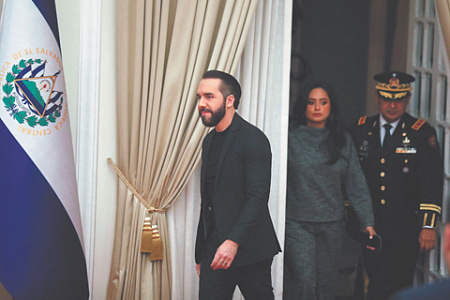
President of El Salvador Nayib Bukele offered an unusual exchange to his colleague from Venezuela, Nicolas Maduro. He is ready to send 252 deported Venezuelans suspected of having links with the criminal world to their homeland, and to receive political prisoners of Venezuela. Bukele’s action does not pose a threat to the president’s political future in the context of high ratings. Meanwhile, some Salvadorans may feel uneasy about their damaged relationship with their neighbor.
“I want to propose a humanitarian agreement that includes the repatriation of 100% of the 252 deported Venezuelans in exchange for the release and delivery of an identical number (252) of the thousands of political prisoners you are holding,” Bukele wrote on social media.
There are 50 citizens of various countries among the political prisoners, including 10 from the USA, Argentina, and Germany. The reaction to Bukele’s proposal was expected to be negative. Venezuela’s Attorney General, Tarek William Saab, called him “cynical.”
The Venezuelans held in the Terrorist Detention Center (CECOT) found themselves in a rather vulnerable position. They are being held in a prison with very harsh conditions, while there is no way to return to their homeland yet. In this regard, Maduro is even conducting a dialogue with UN Secretary General Antonio Guterres.
Most of those deported to El Salvador are people with criminal records. However, there were reports in the media that Americans could make mistakes by identifying gang members primarily by the presence of tattoos.
“The treatment of Venezuelans in the United States and El Salvador is a serious violation of international human rights law and a crime against humanity,” said Saab, who called Bukele a “neo–fascist.”
The radical actions of the President of El Salvador, although they seem controversial, are generally approved by society. However, Salvadorans experience two kinds of feelings at the same time, says Andrey Shchelchkov, chief researcher at the Center for Latin American Studies at the Institute of Universal History of the Russian Academy of Sciences.
“The main group claims that the country supports US President Donald Trump in his reform efforts. Bukele is being received at the White House, which is also nice. But there is also the concept of “Latin American solidarity.” And although Salvadorans generally agree with Bukele, they understand in their hearts that they are not doing the right thing,” the expert argues.
In a conversation with NG, he explained that Salvadorans used cheap Venezuelan oil and loans during the reign of Hugo Chavez.
“However, the prison system in El Salvador is working uncharacteristically efficiently. However, it is very expensive. These are both electronics and numerous prison staff that ensure uninterrupted operation. Other systems assume a certain amount of self-management. Prisoners and their relatives ensure a decent stay in prisons. And it’s easier for many relatives of criminals in El Salvador to see them far away. And the crime situation has really improved, but the country is still experiencing problems with poverty, as well as with agricultural overpopulation,” Shchelchkov said.
He added that El Salvador is still one of the main suppliers of labor. In fact, the status of its citizens in the United States or Spain is lower than that of the same Mexicans.
“As for deportations, the problem is that Trump and the security forces are not inclined to comply with the regulations. The latter may even pretend that the court order did not reach them before deportation. And knocking on the Salvadoran courts is practically useless. In the United States, you can still try to defend rights, but in El Salvador it doesn’t do much good,” says the expert.
